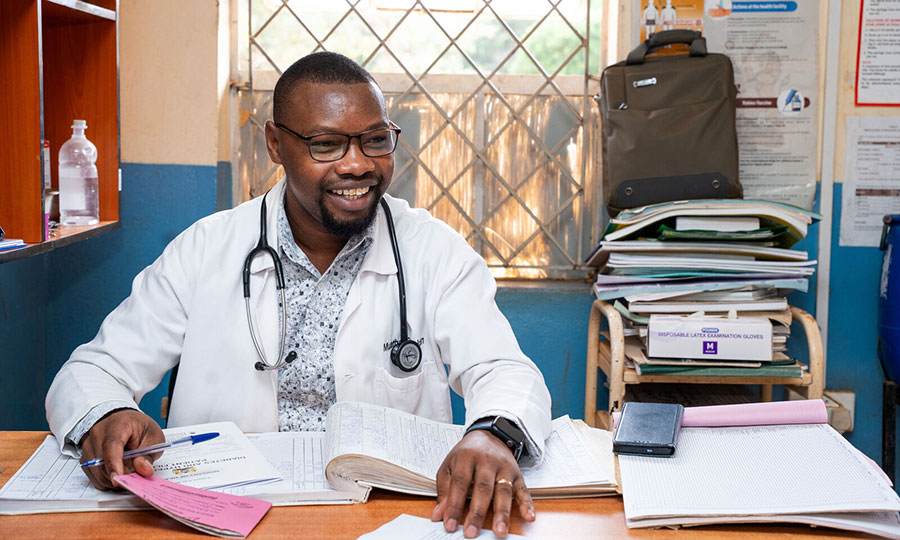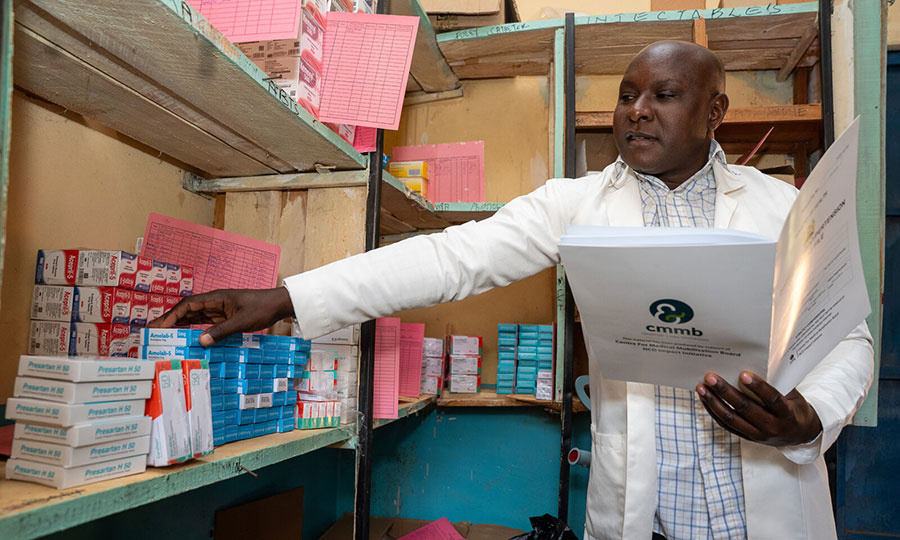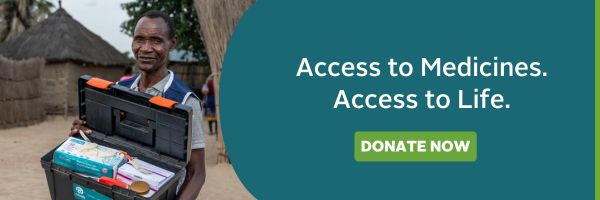Equipping Last-Mile Heroes: CMMB Kenya’s Lifeline for Health Workers and Communities
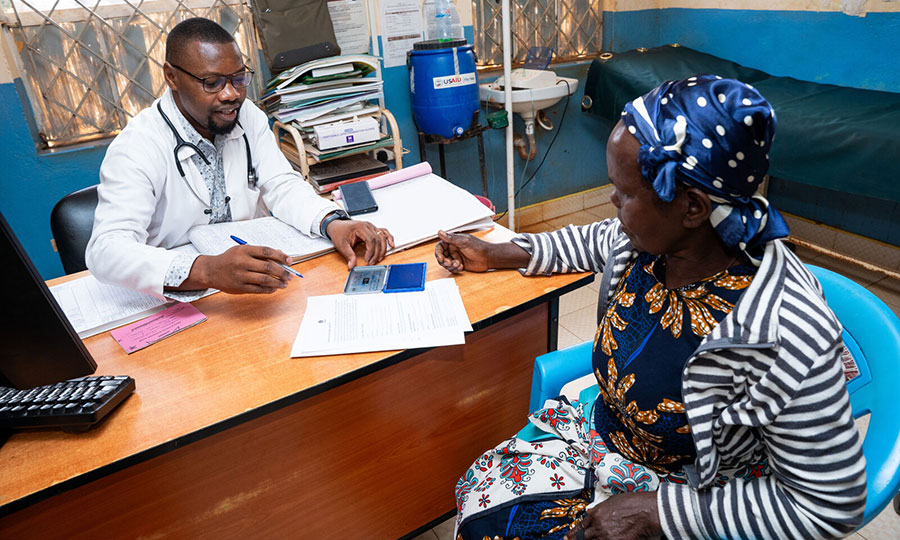
In Miambani, a remote village nestled between the hills in Kitui County of Eastern Kenya, accessing healthcare is a daily struggle. For a community where most residents live in poverty, surviving on minimal harvests and hand-to-mouth livelihoods, noncommunicable diseases (NCDs) like diabetes and hypertension pose an additional silent yet deadly threat. Global challenges like escalating NCD burdens, pandemic risks, climate-driven crises, and rising mental health tolls are seen here too, and place immense pressure on health workers like Eliud, a registered clinical officer (similar to a nurse practitioner in the US) at Miambani Health Center.
With a projected global shortage of 11 million health workers by 2030, inadequate support for these frontline heroes compromises critical services, threatening global health security, economic stability, and development goals. Through its NCD Initiative, part of CMMB’s Global Access to Medicines Program, CMMB Kenya is strengthening the supply chain to ensure essential medicines are reliably available and affordable at 50 underserved health facilities in 10 counties, while also training health workers to effectively treat NCDs. These interventions are demonstrating how targeted investments in health workers and access to NCD medicines for people with diabetes and hypertension can save lives and build more resilient health systems. And the need has never been greater. In Kenya, NCDs are responsible for approximately 39% of deaths—an increase from 27% in 2014. By 2030, NCD-related deaths are projected to increase by another 25%.
Clinical officer Eliud, from Tseikuru in Mwingi North, has served since 2019 and is currently working at Miambani Health Center. Before CMMB Kenya’s support, he faced challenges treating patients. Frequent stock-outs of essential medicines—enalapril, hydrochlorothiazide, nifedipine, and amlodipine for hypertension, and metformin and gliclazide for diabetes—left patients untreated and forced to find and pay for drugs in private pharmacies. The health center operated with irregular supplies, depleting within weeks due to high demand. In Miambani, where poverty prevents most from purchasing medications, patients returned home with dangerously high blood pressure or blood sugar.
“I felt uncomfortable, like I hadn’t offered the service they deserved,” Eliud shared.
The lack of medicines, coupled with shortages of tools like blood pressure machines and glucometer strips for diagnosis, drove up recurrent illness and NCD-related premature mortality rates in this hard-to-reach area.
CMMB Kenya’s intervention, which started last year in collaboration with the Ministry of Health, has been transformational. Today, the health clinic maintains a steady supply of NCD medicines, diagnostics, and reporting tools, and welcomes patients every Wednesday for a weekly NCD clinic. Patient numbers have surged from under 100 to nearly 200, driven by renewed patient trust and access to reliable, free treatment.
“Now, I feel very good,” Eliud said. “When I prescribe, patients get the medication and commit to follow-ups.”
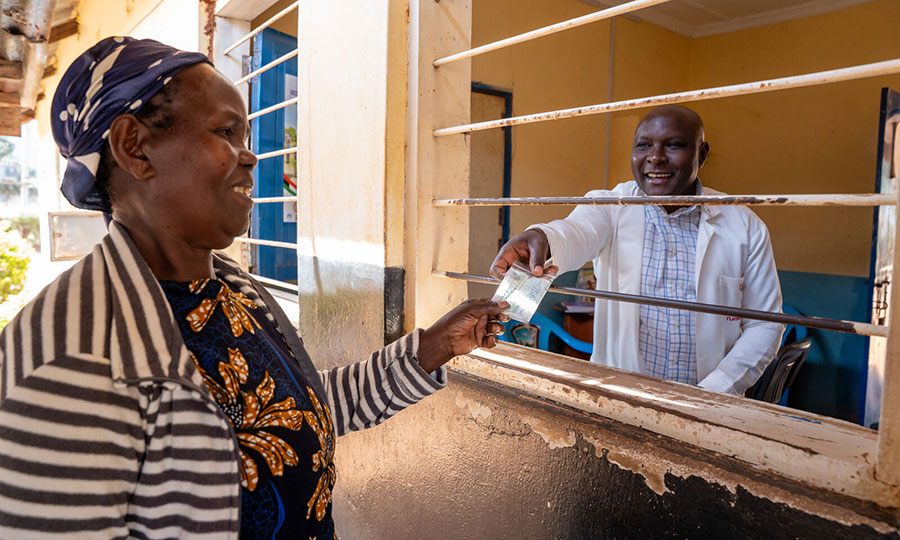
Francis, a pharmacist at Miambani Health Center, provides patient Kandy with her medication for hypertension.
This consistency to taking medication regularly prevents further patient complications, reducing mortality in a region where transport barriers delay emergencies. For families, it means loved ones manage their conditions and return to productive lives and contribute to economic and social stability.
Equally vital is CMMB Kenya’s investment in health worker training, addressing the global call for professional development to strengthen health systems. Eliud attended a three-day workshop in Kitui, learning updated guidelines for managing type 1 and type 2 diabetes and hypertension, and how to use tools for digital patient tracking. CMMB Kenya’s provision of tablets supports a shift to tech-driven care, aligning with the need for innovative solutions to be more efficient and effective, especially with limited clinicians.
“Medicine is dynamic,” Eliud noted. “These trainings help us adhere to current guidelines, boosting our confidence.”
CMMB Kenya’s support has helped Eliud and his colleagues make early diagnoses, provide effective treatments, and conduct community education on NCD preventive measures like adopting a more nutritious diet, directly lowering NCD-related deaths. By equipping health workers with knowledge and technology, CMMB enhances their mental resilience and professional fulfillment, countering the burnout threatening the global health workforce.
So far, the impact has been profound. In Miambani, where hypertension cases are alarmingly high, CMMB Kenya’s NCD Initiative has increased early diagnoses and controlled conditions, reducing the NCD burden. With accessible care, people thrive. Families are healthier and communities experience improved gender equity and economic stability.
Through partnerships with Kenya’s Mission for Essential Drugs and Supplies (MEDS) (a faith-based NGO providing reliable, quality, affordable essential drugs and medical supplies) and the national Social Health Authority National Health Insurance Scheme, Kenyan health facilities maintain reliable treatment supplies, ensuring no patient is turned away. Eliud’s vision for Miambani Health Center for the future reflects this ambition: moving to be a level four hospital with X-ray and ultrasound units, an inpatient ward, and an ambulance for local emergencies. He also advocates for CMMB-supported primary healthcare outreaches to isolated villages, where terrain and poverty still block access. Monthly outreaches could deliver medicines and check-ups, further combating untreated illness by bridging the last-mile gap.
“Some patients can’t make it to the health center,” he explained.
As Kenya prioritizes NCDs amid overlapping global health crises, CMMB Kenya’s model redefines the health workforce’s future to prioritize fair support through reliable medicines, professional development through training, and tech-driven efficiencies like digital platforms. These investments equip health workers like Eliud with the support they need to deliver care that saves lives and strengthens communities—with the support they need to thrive. Eliud sees a future where NCD numbers decline through early intervention and education.
“I appreciate CMMB for the good job they’re doing,” he said.
By prioritizing health workers, CMMB Kenya is not just reducing mortality in Miambani, it’s paving the way for a healthier, more equitable world.
